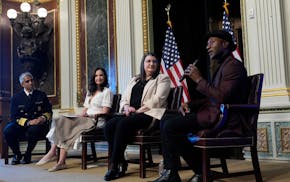The number of Minnesotans with Alzheimer's disease and other forms of dementia will swell from 88,000 now to 198,000 in the next 30 years, with the prospect that state coffers, families and employers could be overwhelmed by the stress and costs of care, according to a report that will be delivered to the Legislature on Thursday.
Without action, the report concludes, "the burden will be heaviest on public funding as the number of individuals with Alzheimer's increase and their family caregivers are stretched beyond their capacity and exhaust their resources."
Fear of the disease and ignorance about treating symptoms have kept many Minnesotans from getting help until caregivers are exhausted and in chaos, advocates say.
The result, they say, is a heavy drain on personal and state finances as patients are placed sooner than necessary in nursing homes and families are battered by the unrelenting stress of caregiving.
"Minnesota is in crisis now — with huge costs and stresses to families, employers and government — and it will get worse as the population ages," said Mary Birchard, executive director of the state Alzheimer's Association, which helped lead the group that developed the report.
Cost savings could be significant, the report says — an attractive prospect, even if not implemented this session, as the state wrestles with a projected $6.2 billion deficit.
With average annual medical costs for an Alzheimer's patient running about $33,000 — triple that of similar people without dementia — cutting expenses even by $5,000 per patient could save $44 million a year.
Communities and families must act to ensure better care and better use of public and private resources, the report says.
In a small way, that's exactly what happened early this week in New Prague with the family of 77-year-old Rollie Tietz .
To cope with the retired businessman's periodic wandering — a frightening behavior that affects 60 percent of Alzheimer's patients— Tietz's family enlisted the help of the police department and two sheriffs' offices to test a device to track him the next time he takes a walk into the snowy night wearing slippers.
For months, Rod Tietz has been worried about his dad, who lives 3 miles outside New Prague. He checked out several devices that could track his dad should he go missing. He chose one sold by EmFinders of Frisco , Texas, using cell phone technology.
"You read about these cases where somebody with Alzheimer's is found dead and you just don't want that to be your dad," Rod Tietz said.
On Monday, he gathered a crowd at the New Prague police department. With his dad at home wearing a device like a wrist watch, Tietz asked his mom to call 911 to report the test, then call the company's 800 number.
Within 10 minutes, the device sent a 911 call that gave authorities his dad's location on a map, with latitude and longitude coordinates — within 100 yards of the house. A second test found a patrolman wearing a similar device.
"This is pretty good," said Police Chief Mark Vosjepka . "We've got a better chance of finding somebody alive, and it cuts way down on our manpower needs."
Rollie's wife, Joanie Tietz, 72, also expressed relief.
"I worked 27 years as an EMT with the ambulance crew and I've seen a lot of bad stuff,'' she said. "But this Alzheimer's, it can just grind you down. I was starting to think, well, how much longer can we go on?"
First, early detection
With 23 recommendations for the Legislature and others for state agencies and the University of Minnesota, the report is among the most comprehensive undertaken in 14 states that have conducted similar analyses, organizers say.
The report's first proposal: Train and encourage doctors to detect Alzheimer's disease early — something often resisted both by doctors and families — which could save the state an average of $10,000 per patient a year.
"There is no cure, but with early detection, treatment can slow the decline by 12 to 18 months for more than half of patients," said Michelle Barclay , a vice president at the state Alzheimer's Association, which helped staff the 20-member group appointed by the Legislature in 2009. The group met for 15 months and involved about 100 others to develop the report.
Initial legislation will be sponsored by Rep. Steve Gottwalt, R-St. Cloud, who led the effort to set up the work group and chairs the House Health and Human Services Reform Committee. His bill will likely seek a better accounting of Minnesotans with dementia and refine care strategies.
Other recommendations include: Require cognitive screening for all Minnesotans 65 and older in state-paid health programs; create a "dementia clearinghouse website" with information for families and professionals; adopt a state "gold standard" for dementia care, and reinstate a geriatrics medical education program at the University of Minnesota.
Additional recommendations for communities and families will be developed by a new work group that starts in several months, officials said.
"In some ways, we don't have a choice," said Birchard. "We act soon … or the situation will be unmanageable."
The 71-page document, "Preparing Minnesota for Alzheimer's: The Budgetary, Social and Personal Impacts," is available at www.alz.org/mnnd .
Warren Wolfe • 612-673-7253

Photographer alleges he was forced to watch Megan Thee Stallion have sex and was unfairly fired
Phish fans are famously dedicated. What happens when they enter the Sphere?
Minneapolis will bid to host Sundance Film Festival

Icehouse on Eat Street in Mpls. facing eviction for unpaid rent
